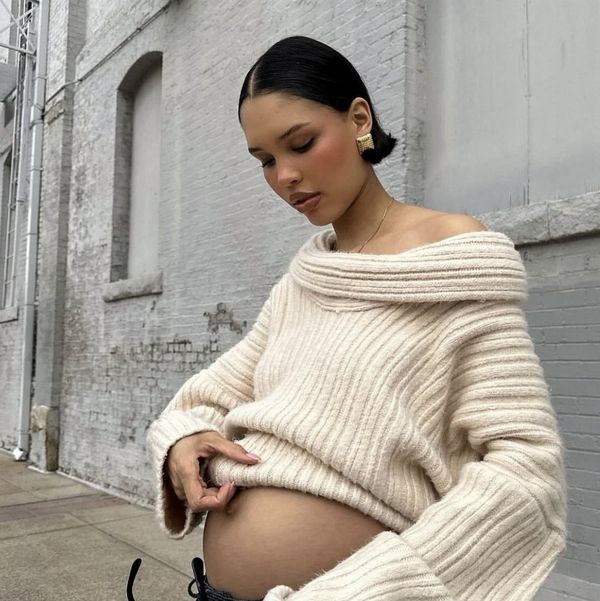Here's Why I Don’t Feel A Way About Using A Weight Loss Drug To Heal My Body

By now, you have all heard of Ozempic, Wegovy, Mounjaro, and Zepbound. These are the newest drugs on the market prescribed for weight loss and obesity. Deemed as the "cheat code" for summer body goals, celebrities like Oprah Winfrey, Al Roker, Whoopi Goldberg, Amy Schumer, Tracey Morgan, Elon Musk, and Chelsea Handler have gone public about their use of the medication to aid in their weight loss journeys. And their results are giving. I mean, have you seen Oprah lately? The woman is 70 years old, and she is serving and giving it all.
Before these drugs were reclassified as weight loss medications by the FDA, these GLP-1 drugs hit the pharmaceutical market solely as a diabetes medication. The side effect of the drug is suppressed hunger and reduced “food noise.” These medications help overweight and/or obese patients successfully lose 25% of their body weight or more. Continuous debates on social media and news outlets are trending on the success of the drug in the fight against obesity, but also on the medical dangers and long-term side effects of using these drugs.
Nonetheless, the demand for these weight loss drugs continues to skyrocket, creating mass shortages from manufacturers Eli Lilly and Novo Nordisk.
The demand for these types of medication has created an unprecedented effect when it comes to access for patients with a medical diagnosis or not. Health insurance providers only cover the drug with a diabetes diagnosis or through an authorization process, thus creating an expensive out-of-pocket cost to patients. The cost of these medications is not cheap. Any variation of these GLP-1 drugs ranges from $1000-$1,500 per monthly supply.
Times that by three, six, or nine months – that is the equivalent of a luxurious international vacation or a down payment for a new car. Primary care physicians and medical specialists are writing prescriptions with no hesitation. And patients are willing to pay whether it is a medical necessity or not.
My truth: I am a 39-year-old woman who was previously 49 pounds overweight. I was prescribed a GLP-1 medication to heal my body, and I feel no type of way about it.
But before I share my story and justify my reasoning for using a weight loss medication, let’s first examine the facts to provide perspective and understand the underlying causes of weight gain because no two individuals's health and wellness journeys are identical.
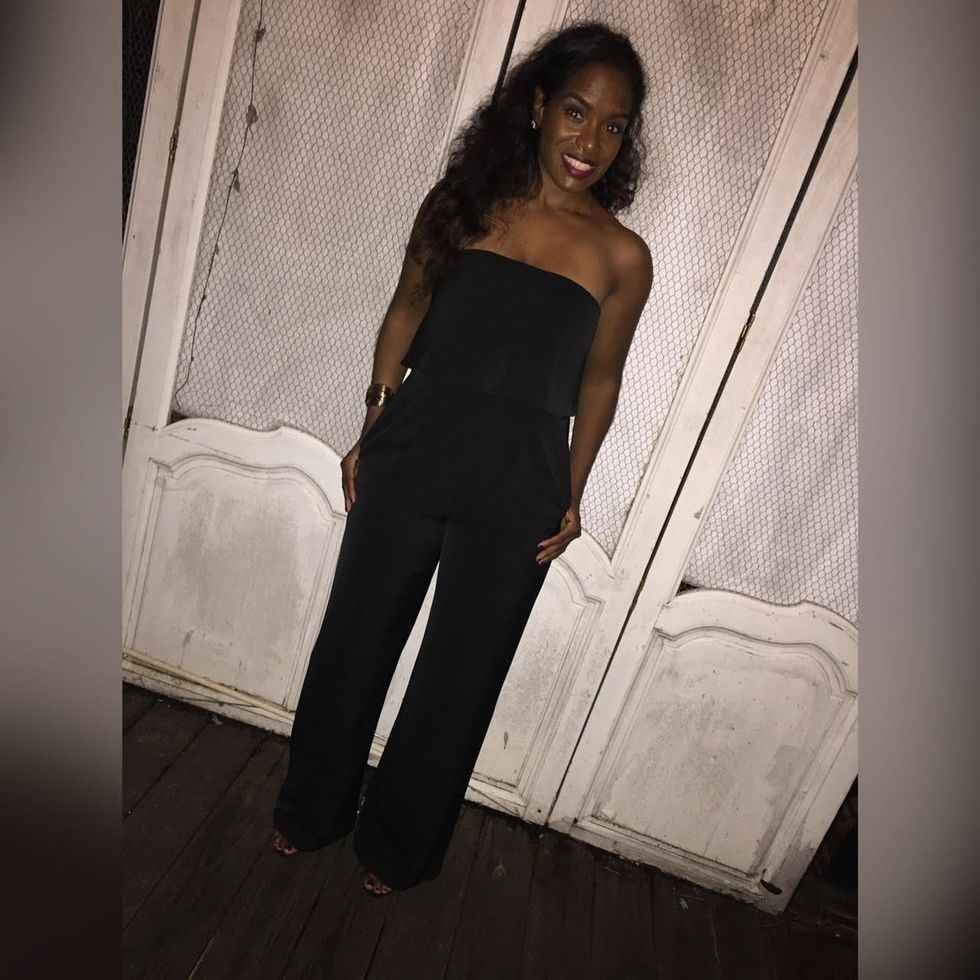
2015 - the last time I was 135 pounds
Courtesy of the writer
The Weight Loss Drugs Facts Presented By Oprah
On March 18, 2024, ABC Network aired An Oprah Special: Shame, Blame, and the Weight Loss Revolution. The purpose of the interview is to release the stigma, shame, and judgment for individuals who are overweight and how they choose to lose or not lose weight. The interview provides a 360-view of the biology of obesity, the use of weight loss medication, and the pharmaceutical industry. Invited to the conversation are users of the drug, medical specialists, representatives from the manufacturing companies of the medications, and the CEO of Weight Watchers.
The audience is comprised of current and past users of a GLP-1 or semaglutide medication. Oprah begins her interview special by openly discussing her struggle with her own weight. She states, “For 25 years making fun of my weight was a national sport.” In 1990, TV Guide referred to Oprah as “bumpy, lumpy, and downright dumpy.” Oprah also openly admits she starved herself for five months to lose 67 pounds on a liquid diet, which she gained back in less than days.
What The Experts Say About Obesity
Oprah states that the American Medical Association defined obesity as a chronic disease 10 years ago. Dr. W. Scott Butsch, Director of the Obesity Medicine in the Bariatric and Metabolic Institute at the Cleveland Clinic shares in the interview that obesity is a complex disease. Think about genetics, environments, food, sleep patterns, and microbiome changes. He states that it is the brain that controls body fat, food intake, and metabolism.
Obesity is defined as dysfunction of the regulatory system – when you lose weight, it intentionally slows your metabolism down, and your body is built to maintain your weight. Dr. Butsch continues to explain that some people are prone to hold on to their body fat. Therefore, it is wrong to shame people about obesity as they are subtypes of the disease in the obesity spectrum.
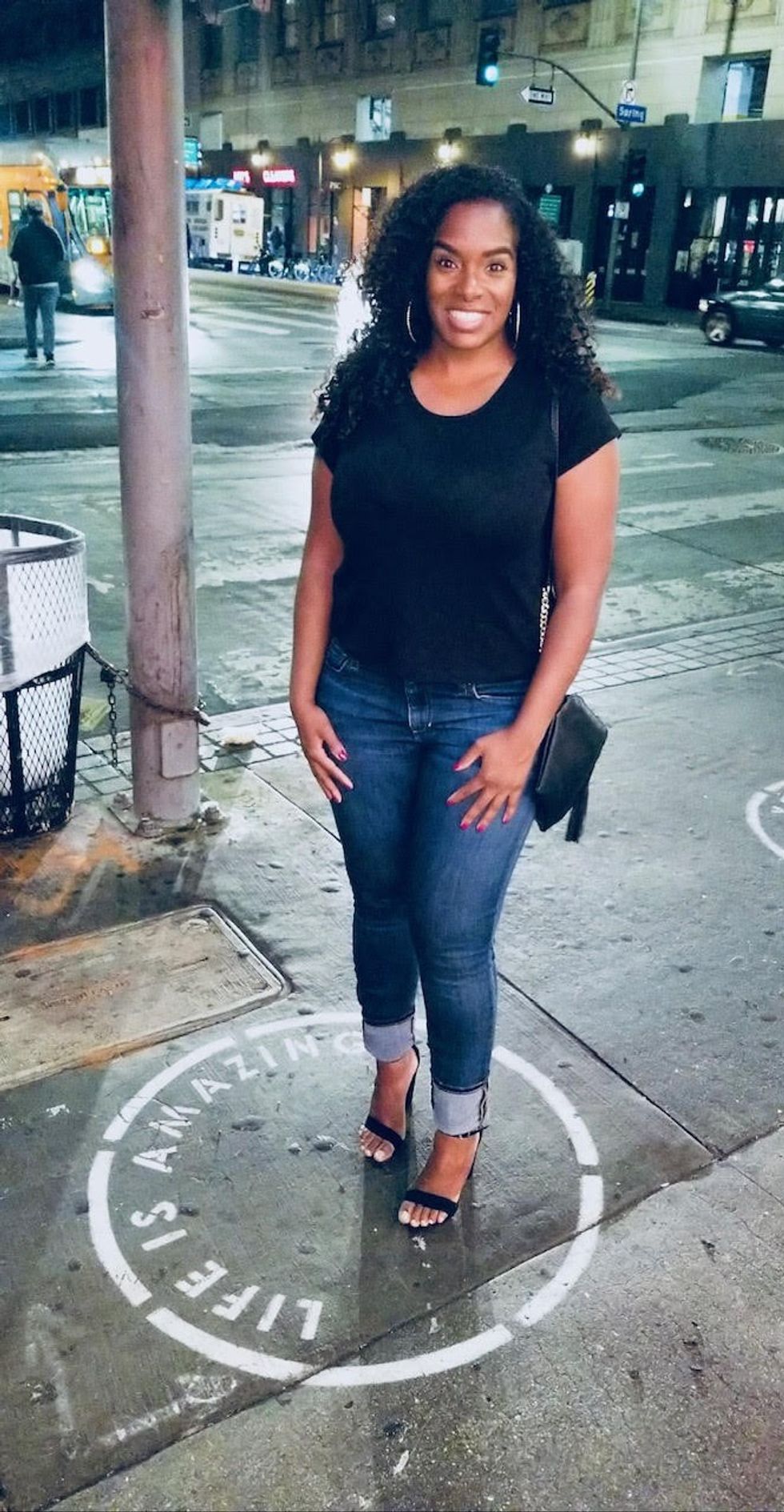
2018 - probably 160-175 lbs.
Courtesy of the writer
Types Of Weight Loss Drugs
Dr. Amanda Velasquez, Assistant Professor of Cedars-Sinai Surgery and Director of Obesity Medicine & Center of Metabolic Health states to date there are seven medications available to treat obesity, including glucagon-like-peptide 1 hormone (GLP-1s). This hormone is produced by the gastrointestinal organ and GLP-1s mimic what the hormone does and does it better. This means reducing food noise, feeling satiety faster, and slowing digestion. For people who are living with obesity, their GLP-1 hormone isn’t working properly. With that said, the medication reprograms the gastrointestinal organ.
Data does show that obesity patients would have to be on medications for the rest of their lives as the disease does not stay in remission. However, Oprah maintains her weight by hiking, walking, running, weight training, and a healthy diet. It is important to note that the Food and Drug Administration (FDA) approved drugs like Ozempic 20 years ago for type II diabetes. Dr. Velasquez further states the side effects of choosing not to take the medications are higher than the mild side effects of nausea and vomiting – obesity is a disease, not a character flaw.
Weight Loss Issues
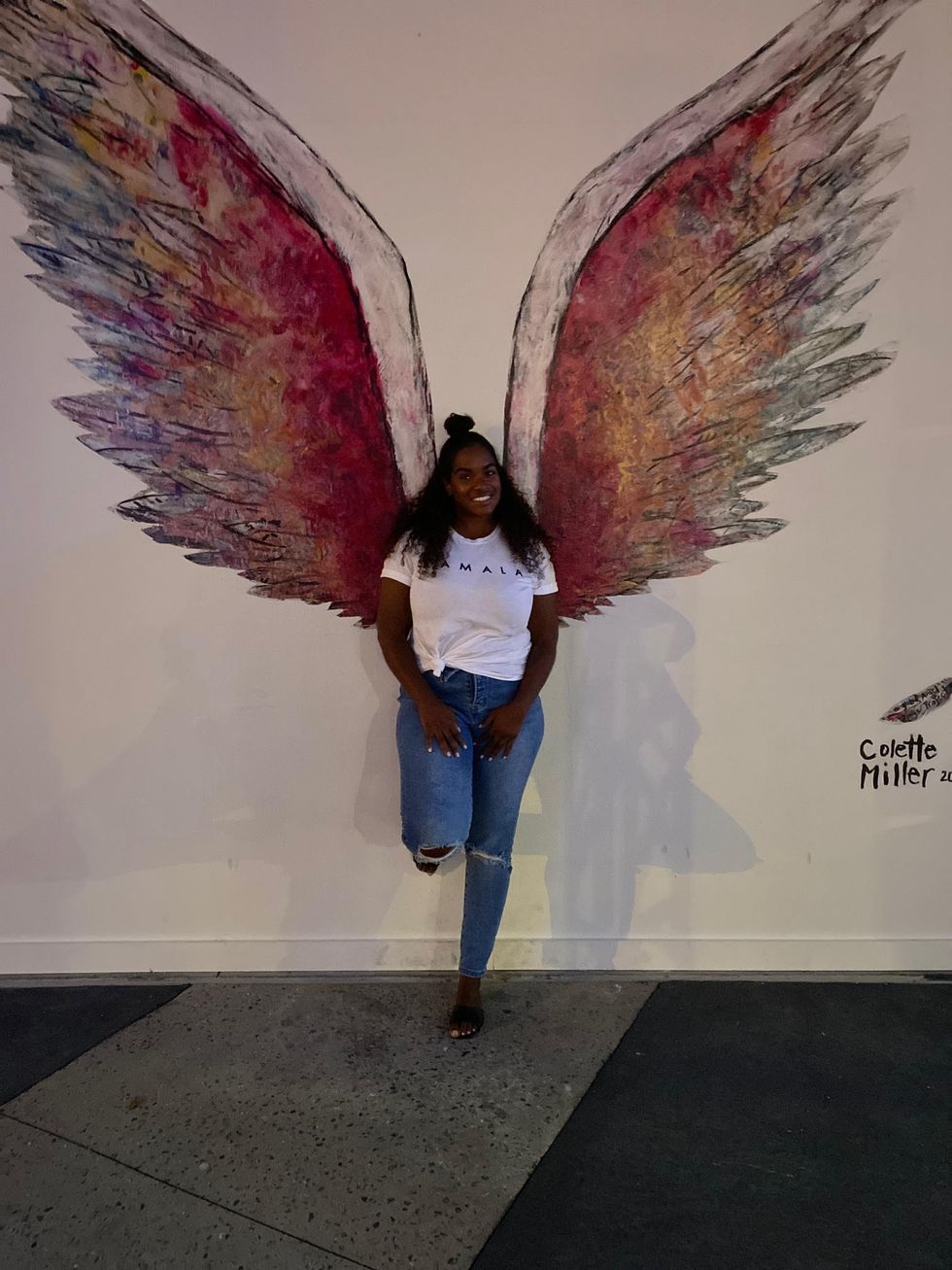
2021- 170-180 lbs
Courtesy of the writer
Now that we are clear on the biology of obesity, let’s get into my weight issues. I was born 0.9 pounds as a premature twin baby. I graduated high school at 115 pounds, graduated college at 125 pounds, and graduate school at 128 pounds. Given these numbers, you can see I was never a heavy-set person. Picture runway model skinny with tig ol’ bitties. Yes, that was me. It wasn’t until I transitioned into a high-stress career that my lifestyle habits began to change. I began to gain some weight. I went from 135 pounds in 2016 to 150-something pounds in 2017.
At the time some of my friends would say, “I look healthy” or “you look good” given I was in my early thirties. Now, combine a high-stress career with mental health issues, emotional trauma, and a worldwide pandemic together. Add 32 more pounds to the weight I previously gained – your girl is now THICC at 182 pounds. Even though I carried this new weight well, it was too much for my height of 5 '4 and small frame. Not only did I know this, but I felt it too. It was the way my clothes slowly stopped fitting me and the heavy breathing. It’s true – the body really does keep the score.
Returning To A Healthy Lifestyle & A Medical Diagnosis
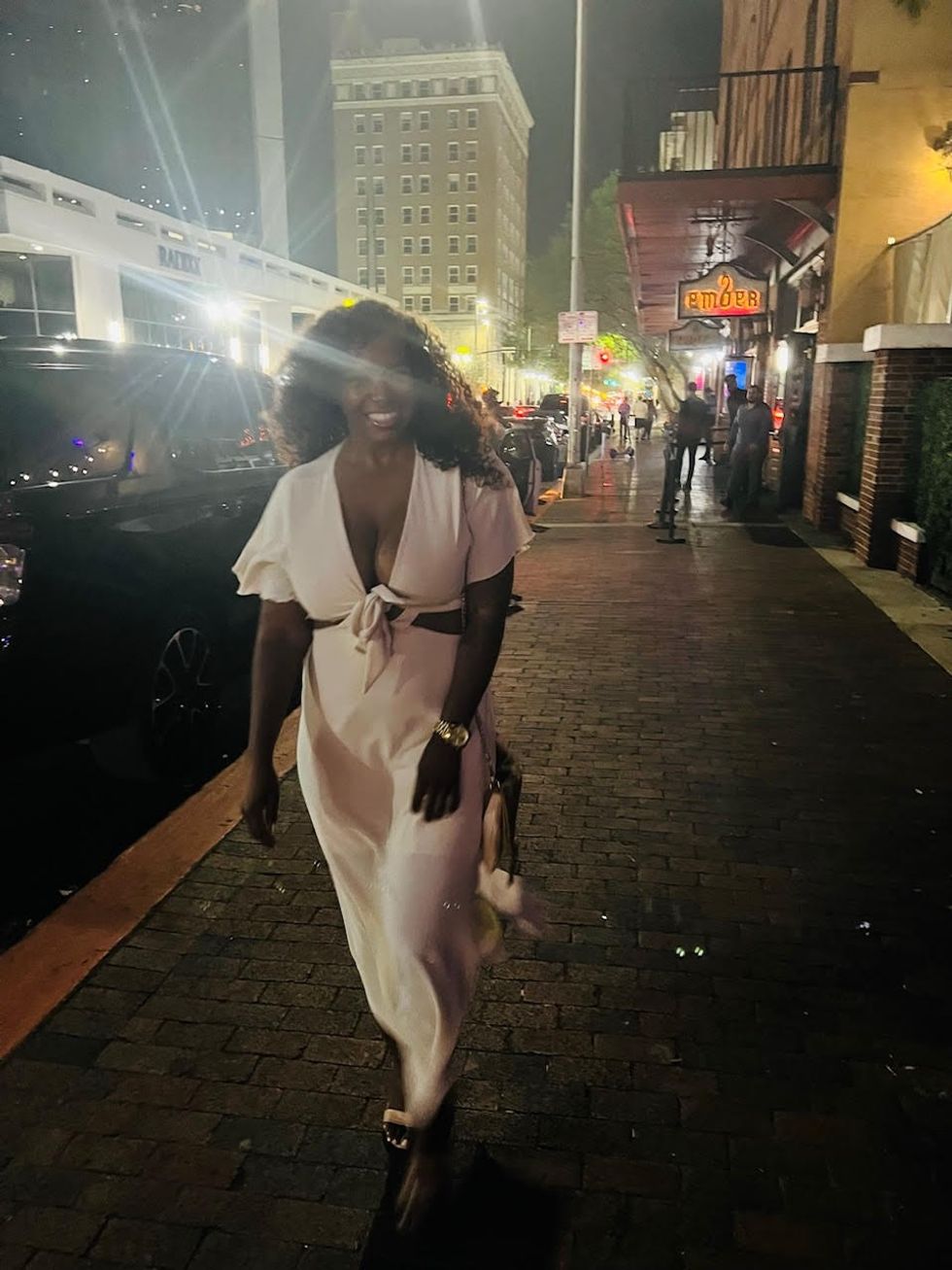
March 2023- 150 lbs
Courtesy of the writer
In 2019, I left my corporate career which eliminated my main source of stress. As the pandemic came to an end in 2021, fitness clubs fully reopened. I returned to the gym and my healthy lifestyle habits seamlessly. Please note I have always been a gym-goer or someone who enjoyed working out and eating healthy since 2011. I went back to my normal workout routine – running, climbing the stair mill, lifting weights on my own, and enlisted the help of a personal trainer twice a week.
It wasn’t until January 2022 that I noticed that the weight was not moving despite my clean eating and disciplined efforts.
In February 2022, I decided to seek medical assistance from my primary care physician, gynecologist, endocrinologist, and holistic/functional medicine doctor. It took a whole eight months before I received a proper medical diagnosis and clarity as to why my body was not responding to my normal weight loss efforts.
The answer was rooted in trauma and a hormonal imbalance, which gave me an autoimmune disease – Hashimoto Thyroiditis.
A Heavy Decision

June 2023- 133 lbs
Courtesy of the writer
It was September 2022 when I decided to pursue functional medicine to heal my body. I detoxed for 8 months with Chinese herbs, a paleo diet, and daily workouts. And it was the end of October 2022 when my endocrinologist said to me, “I am going to help you.” He said, “Have you heard of Eli Lilly?” I replied, “No.” My endocrinologist went on to explain that Eli Lilly manufactures the newest diabetes drug Mounjaro. A medication that beat clinical trials against Ozempic and Wegovy.
This new medication helps patients lower their A1C, and glucose, promotes insulin sensitivity, and helps patients lose 25% of their body weight. Keep in mind this was my first time hearing about medications for weight loss in general. I never had to be on medication for anything in my life outside the normal cold, sinus infection, flu, birth control, and hormonal acne.
The idea of prescribed medication to lose weight sounded absurd.
We are constantly told by the fitness industry to eat clean, eat our macros, stay in a caloric deficit, and work out. However, the body is complex – what they don’t tell women is that the problem is very much hormonal, and a holistic approach is required. At first, I was against using the medication because I did feel like it was cheating. I felt a sense of shame and anxiety too. “What are my family and friends going to say?” was my first thought.
I am the type of person who believes in discipline, consistency, hard work, and making the right decisions always gets you where you need to be. BUT, what my endocrinologist explained to me was that my body stopped responding due to my hormonal imbalance. He further explained that Mounjaro will stimulate my insulin (FYI insulin is a hormone) to function properly so that my body can naturally lose and/or maintain weight.
What I needed was what my endocrinologist referred to as a metabolic reset. This is achieved by losing 25% percent or more of my body weight. I had waited a good three months to secure an appointment with this man. And he wasn’t just any endocrinologist – he was the director of an endocrinology and diabetes institute. So, I decided to appease him and told him to “write the script.”
The Journey To Healing My Body
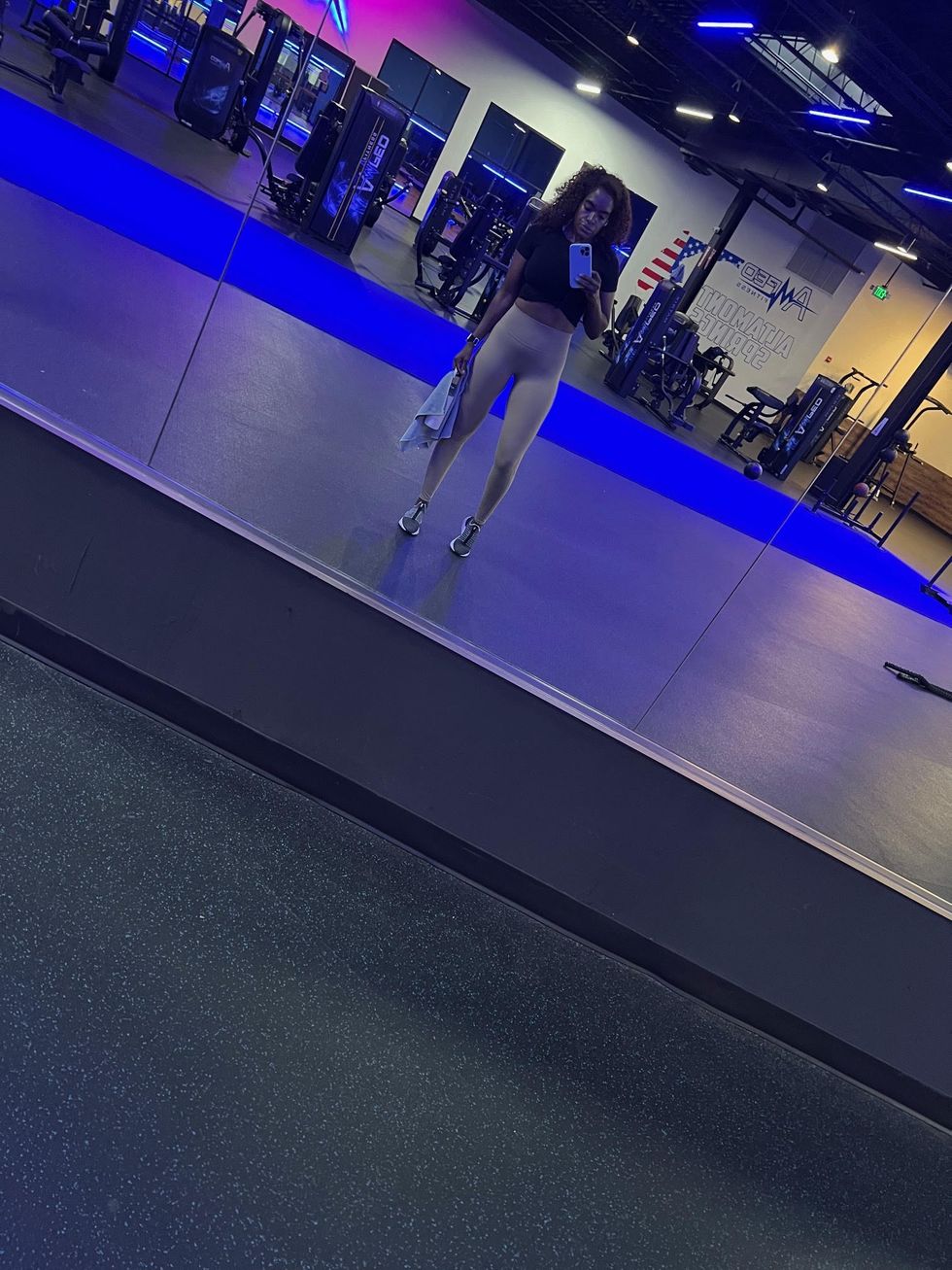
Currently 137 lbs
Courtesy of the writer
After I was prescribed Mounjaro and before I administered my first dose, I went down the rabbit hole of looking at TikTok videos from users who were prescribed a GLP-1. I wanted to listen to their reviews, success stories, and experiences with the side effects. I wanted to see what their diets looked like and if they gained any weight after coming off the medication. What I found was that most people did lose the weight they needed to. I also found that women who have insulin resistance (my initial diagnosis) and polycystic ovarian syndrome (PCOS) were using GLP-1 medications too. They were also successful in achieving a healthier weight.
There were a few TikTok users who reported experiencing the known side effects of nausea, vomiting, bowel changes, and loss of appetite. When it came to diet, I noticed that either these people were not eating clean, unprocessed foods or they were barely eating at all. A lot of the content found on TikTok when it comes to diet was packaged, processed foods or fast food (i.e. Chipotle or Chick-fil-A salad). As for exercise, there were some people that worked out daily and others that did not.
With that said, my approach to using Mounjaro was completely different. I know myself, and my goal was to be healthy regardless of choices and sacrifices I had to make. I wasn’t interested in instant gratification, I was interested in longevity and sustainability.
Having started a holistic detox, I had previously adopted a paleo diet in conjunction with the medication. Organic meat, fish, vegetables, and fruit. I started to read food labels and if it had some long scientific ingredients – I wasn’t buying it. I also eliminated soy, dairy, sugar, caffeine, gluten, alcohol, white carbs, legumes, and inflammatory oils (seed and vegetable oils). I continued my daily workouts five times a week, controlled my stress, and adopted a new sleep routine.
Come November 2022, I injected my first dose of Mounjaro into my belly. I did experience changes in my bowels for one week as my body adjusted to the medication. It wasn’t enjoyable, but I survived.
I think I vomited a total of two times but I cannot confirm if it was a reaction to the detox phase I was in or the medication. By the end of December 2022, I had lost 15 pounds and by the end of February 2023, I had lost an additional 13 pounds. I continued to stay disciplined and consistent with everything I was doing. I was motivated by the results, more so because the medication wasn’t cheap and neither was the holistic detox.
By May 2023 I had achieved a metabolic reset by losing 25% of my body weight. My bloodwork showed an insulin level of below ten. The endocrinologist said going forward metabolic indicators are how flat my stomach is. Pay attention to my sugar and salt cravings – not the number on the scale.
Let me tell you my stomach is flatter than it used to be and I don’t crave any sugar or salt.
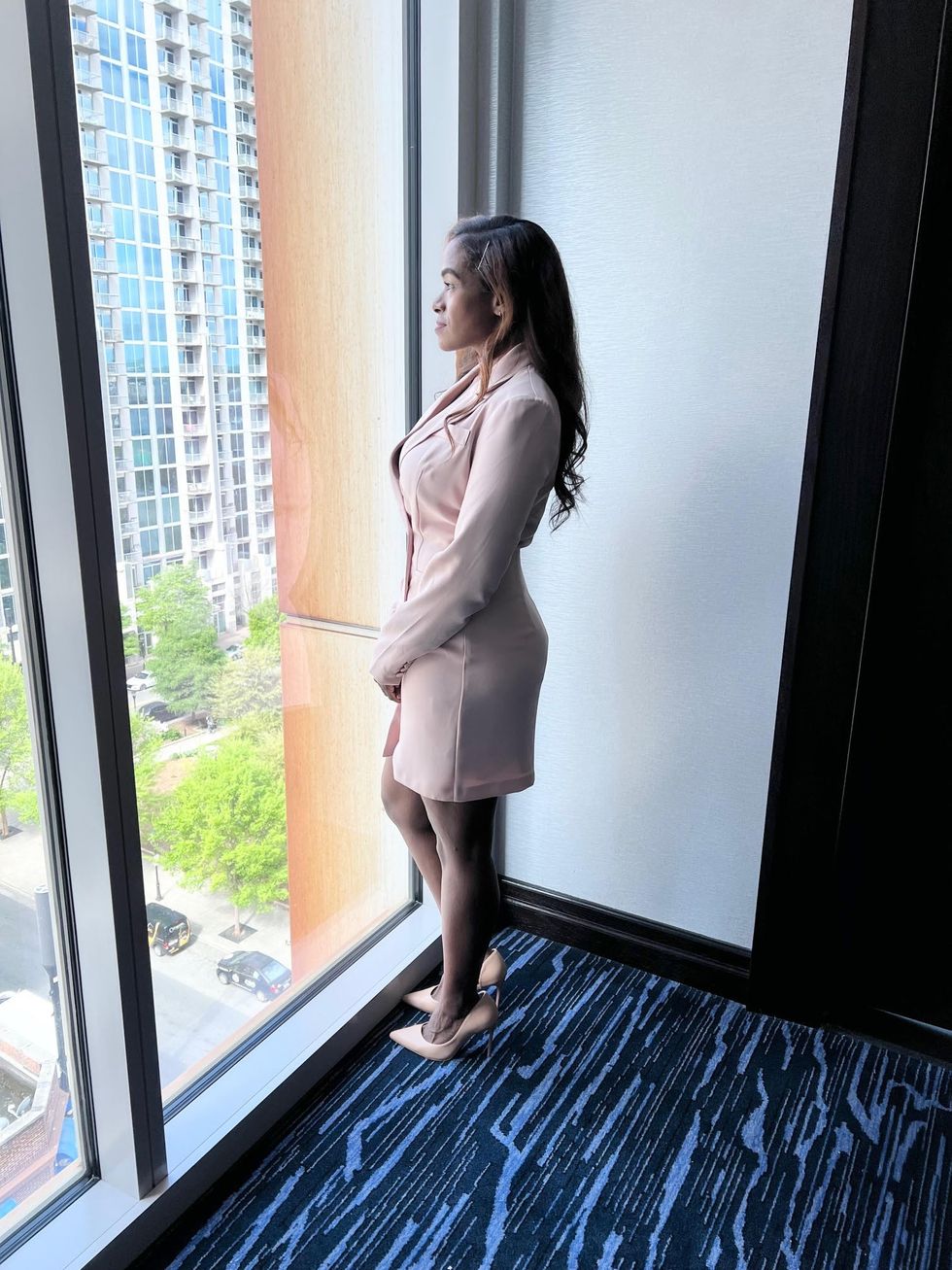
Courtesy of the writer
May 2024 will make it one year since I am Mounjaro free. And guess what? I have maintained my weight by strictly adhering to my paleo diet, lifestyle habits, and gym routine.
In May 2023, my weight was 137 pounds; in December 2023, I weighed 134 pounds. As of today, I currently weigh 137 pounds. I have achieved an insulin level (3.5) of a pro-athlete, which shocked my endocrinologist. In eight months, I will be 40 years old. I can run a mile in under nine minutes and three miles in under 35 minutes, and I lift moderately heavy for a girl.
I have no regrets about using a weight loss medication to heal my body nor do I feel any shame around my decision. My medical issues and circumstances are unique to me. I didn’t do anything different other than advocate for my health, seek the right answers, and execute accordingly.
For me, it is very rewarding to know that I am in good health thus far and the lab work shows. I am so grateful to have the information and resources accessible to me so that I could heal my body.
My physical transformation wasn’t just about losing weight – it was about getting back to myself. For years, all I wanted was to get me back. And that’s exactly what I went and did. I would say when it comes to navigating the decision to use weight loss medications to heal your body – listen to yourself first.
It’s okay to ask for help from your doctor – especially when it’s deemed medically necessary or if your body isn’t functioning properly. It’s not just about how you look and feel but it’s also about your general health too. Good health surpasses any negative opinions formed against you.
Let’s make things inbox official! Sign up for the xoNecole newsletter for daily love, wellness, career, and exclusive content delivered straight to your inbox.
Feature image courtesy
- Ayesha Curry Lost 35 Pounds Since January. Here's How She Did It. ›
- Here's What Issa Rae Did To Lose Her "New Money Weight" ›
- Lizzo Shares Her Views On The Evolution Of 'Body Positivity' Amid Weight Loss Journey ›
- The Truth About Medical Weight Loss Clinics: Do Diet Pills Actually Work? ›
This Is How To Keep 'Holiday Season Stress' From Infecting Your Relationship
Hmph. Maybe it’s just me, but it seems like there is something really weird happening in the fall season air (because winter doesn’t officially begin until December 21) that cuddle season is in full swing while break-up season is as well. In fact, did you know that break-ups are so popular during the holiday season that December 11 is deemed Break-Up Day?
The reasons why relationships shift around this time vary; however, I did both roll my eyes and chuckle when I read that a very popular one is because it’s an easy way to get out of getting one’s significant other a Christmas present. SMDH.
Anyway, I personally think that the less shallow folks out here may contemplate calling things “quits” or they at least distance themselves a bit from their partner (and what I’m referring to is serious relationships) due to all of the stress and strain that oftentimes comes with the holidays whether it be financial, familial, due to their tight schedules or something else.
Listen, I would hate for you and your man to miss the fun and happiness of experiencing this time of year, all because you are so overwhelmed or irritated that you can’t really enjoy it. That’s why I have a few practical tips for how to avoid allowing the typical holiday season stress from INFECTING your relationship.
Manage Your Expectations
 Giphy
GiphyUnmanaged expectations. If there is a main reason why the holiday season tends to be so stress-filled for so many people, I’d bet good money that this is the cause. And when you’re in a long-term relationship, expectations can manifest themselves in all sorts of cryptic and/or unexpected ways. You might have relatives who assume that you are going to be with them for Thanksgiving or Christmas when you have other plans in mind. You might be thinking that you are going to spend one amount for presents while your man is thinking something totally different. When it comes to scheduling, your signals may be crossed.
And you know what? To all of these scenarios, this is where clear and consistent communication come in. Don’t assume anything. Don’t dictate anything either. From now until New Year’s, mutually decide to check in once a week, just to make sure that you are both on the same page as it relates to the holidays and what you both are thinking will come along with it. The less blindsided you both feel, the less stressed out you will be. Trust me on this.
Set (and Keep) a Budget
 Giphy
GiphyOkay, so I read that last year, 36 percent of Americans incurred some type of holiday-related debt. Hmph. Last year, there was still some sense of normalcy in this country, chile, so I can only imagine what finances are gonna look like over the next several weeks. That said, since I don’t know a lot of people who don’t find being broke stressful, make sure that you and your bae set a budget and then stick to it this year — no ifs, ands or buts.
Because really, y’all — it doesn’t make sense to deplete savings and/or max out credit cards for a few days of giggles only to be damn near losing your mind because you don’t know how to make ends meet come Dr. Martin Luther King, Jr. Day.
And by the way, this tip doesn’t just speak to things like food and gifts; I also mean travel. If it doesn’t make a ton of sense (or cents) to be all over the place this year — DON’T BE.
Keep Matthew 5:37 at the Forefront
 Giphy
GiphyIf off the top of your head, you don’t know what Matthew 5:37 says, no worries, here ya go: “But let your ‘Yes’ be ‘Yes,’ and your ‘No,’ ‘No.’ For whatever is more than these is from the evil one.” That verse right there? Oh, it’s a boundaries lifesaver! I say that because do you see “maybe” or “I’ll think about it” in there? Nope. LOL. It says that you should tell people “yes” or “no” and leave it at that — and that complements Anne Lamott’s quote, “’No’ is a complete sentence” impeccably well. Yeah, you’ve got to remember that anything beyond a yes or no to a request is privileged information; you don’t owe anyone details or an explanation.
Besides, if you are really honest with yourself, when someone asks you something and you give a “Umm, let me think about it” kind of reply, more times than not, you already know what your answer is going to be — so why not let you both off of the hook? Give your response. Commit to that. And let everyone (including yourself) get on with their lives and schedules.
I promise you that when it comes to those holiday parties, you are pissing more folks off by not RSVP’ing or doing so and not showing up than just saying, “Thank you but not this year” off the rip.
Remember That Your Personal Space Is Privilege Not a Right
 Giphy
GiphyA friend of mine recently bought a new house and invited me over to come see it. He’s a single man with no children, so as I was taking in all of the space that he had, especially as I walked through his finished basement, I joked about relatives coming to live with him. “Hell no” and “absolutely not” were pretty much his immediate responses as he went on to say that some folks even had the nerve to be offended when he told them that he had no intentions on taking DNA in.
Ain’t it wild how people think that your stuff is their right? And yes, that brings me to my next point. Your home is your sanctuary space. If you want to host folks this year — cool. If not, ALSO COOL. Please don’t let folks (family included) guilt you into how they want you to act or even into what they would do if the shoe was on the other foot. You are not them — and as one of my favorite quotes states, “If two people were exactly alike, one of them would be unnecessary.” (A man by the name Larry Dixon said that.)
Hell, my friends? They know that I am good for sending them random things that they need or even want all throughout the year. Coming over to hang out at my pace, though. Uh-uh. Chalk it up to being a card-carrying member of the ambivert club yet I like keeping my living space personal — and I sleep like a baby, each and every night, for feeling that way.
Always remember that your space, your time, your resources, your energy and shoot, yourself period (including your relationship), are all things that are your own. You get to choose how, when and why you want to share them. The holiday season is certainly no exception.
Cultivate Some “You Two Only” Traditions
 Giphy
GiphyIt’s not uncommon for some couples to hit me up after the holiday season to “detox.” Sometimes it’s due to the financial drama (and sometimes trauma) that they experienced. Sometimes it’s because they allowed their relatives (especially in-laws) to get more into their personal business than they should’ve. More than anything, though, it tends to be because they didn’t get enough quality time together and so ended up feeling “disconnected.”
Please don’t let that happen. Listen, I’m not even a holidays kind of woman and yet, I will absolutely sit myself down with some hot chocolate and chocolate chip cookies to enjoy a Hallmark holiday film or two. Aside from the fact that most of them are lighthearted and sweet, I also like that they usually focus on couples loving on each other amidst all of the holiday beauty and ambiance — which is something that all couples should set aside some time to do.
Maybe it’s a vacation. Maybe it’s a staycation. Or maybe it’s my personal favorite, A SEXCATION. Whether it’s for a few days, the weekend or even overnight — don’t you let the holidays go by without setting aside time for you and your man to celebrate one another. Don’t you dare (check out “Are You Ready To Have Some Very Merry 'Christmas Sex'?”).
GET. SOME. REST.
 Giphy
GiphyI once read that 8 out of 10 people get stressed out over the holidays and 3 out of 10 lose sleep during to it — and when you’re stress-filled and sleep-deprived, that can absolutely lead to hypersensitivity, making mountains out of molehills and even not being in the mood for sex.
Your relationship can’t afford to go through any of this, so definitely make sure to prioritize rest. I don’t care how unrealistic it might seem during this time, sleep should never be seen as a luxury; it will always and forever be a great necessity.
That said, try to get no less than six hours of shut-eye in (check out “6 Fascinating Ways Sex And Sleep Definitely Go Hand In Hand”) and even ask your bae to take a nap with you sometimes (check out “Wanna Have Some Next-Level Sex? Take A Nap, Sis.”). Not only will sleep help to restore your mind, body and spirit but, when it’s with your partner, it’s an act of intimacy that can make you both feel super connected, even in the midst of what might feel like chaos.
___
Holiday season stress is real. Still, never give it the permission or power to throw your relationship off. Put you and your man first and let the holidays be what they are gonna be, chile.
Let’s make things inbox official! Sign up for the xoNecole newsletter for love, wellness, career, and exclusive content delivered straight to your inbox.
Featured image by Shutterstock
Dreaming Of A White Christmas? These 7 Winter Wonderland Destinations Are Perfect For The Holidays
While most people opt for a tropical vacation during the winter months, there are still many people who want to fulfill their winter wonderland fantasies, which are more than likely centered on watching snow by the fireplace while sipping some hot cocoa.
With Thanksgiving vastly approaching and Christmas a little under a month away, there is still time to ditch the traditional Christmas home to visit family or friends.
Whether you’re looking to put a new stamp on your passport and keep things domestic with a destination in the States, xoNecole has you covered with a few hotspots for those itching to go somewhere cold (but with cozy vibes) this holiday season.
Aspen, Colorado
Our Christmas queen, Mariah Carey, has been taking an annual trip to this snowy destination since 1997, just three years after dropping the track that would make her the unofficial (but official to us) ambassador of the winter holiday.
Aside from being a key vacation spot for one of the culture’s greatest musicians, Aspen also offers travelers access to world-class skiing and snowboarding and four distinct mountains that provide the perfect backdrop for a winter vacation.
Whistler, British Columbia, Canada
Home to the largest ski resort in North America, Whistler Blackcomb, this destination is located in the Coast Mountain Range and is about 75 miles north of Vancouver.
From luxury spas like Scandinave Spa Whistler to Olympic Park, this is another top winter vacation spot that offers a unique experience for people who love snow and the thrill of a good adventure.
Western Massachusetts
Dubbed the place for a magical holiday escape, Springfield, Massachusetts, blends the warmth of small-town charm with unforgettable experiences like Grinchmas at Springfield Museums, Winterlights at Naumkeag in Stockbridge, Historic Deerfield’s Winter Frolic, and many others.
This destination offers something for all ages, and it’s close to home, making it all the more reason to place on your radar for a winter getaway.
Rovaniemi, Finland
If you want to really get into the Christmas spirit, this just may be the place for you. As the official home to Saint Nick himself, Rovaniemi, Finland offers reindeer sleigh rides, the opportunity to stay in a glass igloo, as well as an opportunity to experience the Santa Claus Village.
Lake Tahoe, California/Nevada
Who says that visits to the lake house are only reserved for summer vacation? A winter trip to Lake Tahoe is equipped with stunning lake views and top-notch ski resorts, including Heavenly and Northstar.
Chamonix, France
Sitting at the base of Mont Blanc, Chamonix, France, is known for its skiing and mountaineering. This destination is home to the Aiguille du Midi cable car, the charming Alpine village, and is also close to various other European ski destinations.
Northeastern Pennsylvania
This area of the U.S. state is home to the Poconos Mountains, whose renowned ski resorts include Camelback Mountain, Blue Mountain, and Jack Frost Big Boulder. Whether you’re a ski expert, a beginner, or just there for the vibes, this destination makes for a winter vacation that balances fun adventures and cozy getaways. Additionally, Pennsylvania is home to the Christmas Tree Capital of the world.
Feature image by Shutterstock
Originally published on November 23, 2024







